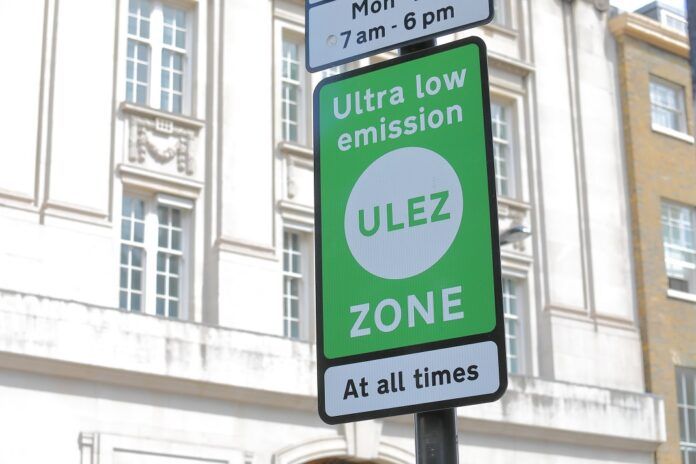The Builders Merchants Federation (BMF) has written to the Mayor of London (see below story) expressing its concern that Greater London may become a no-go area for many SME builders and other trades following the introduction of the expanded Ultra-Low Emission Zone (ULEZ) in August.
The ULEZ is set to be expanded on August 29, imposing a £12.50 daily charge on non-compliant vehicles across all London boroughs. This means that anyone using a diesel van registered before September 2016 or petrol van registered before January 2006 will be charged to travel almost anywhere within the M25.
John Newcomb, CEO of the BMF, said: “This is likely to impact SME tradespeople operating within the M25 as a significant proportion rely on non-compliant vehicles for their work. We can foresee a reluctance on their part to accept new work within the Greater London Boundary.
“This will have a knock-on effect for end customers, who will find it more difficult and costly to get work done. It will also affect sales turnover at merchant outlets within the new boundary, which will have consequences on the amounts of stock held and on their staffing levels.
“We have, therefore, written to Sadiq Khan, the Mayor of London, calling for this policy to be reconsidered.”
Builders merchants agree:
Shanker Patel, CEO of Lords Builders Merchants, which has 13 branches employs 300 staff operating across Greater London, said: “We believe the introduction of the ULEZ extension will hurt the very people it is designed to assist. Transport for London should look to delay the introduction until such time as the current high level of inflation reduces, so those affected can afford to change their vehicles.”
Frank Elkins, COO of Travis Perkins, said: “Although we fully appreciate the need to drive the impact of emissions down across the whole country, we are asking for more time for residents, tradespersons and workers to be able to adapt.”
Howard Luft, CEO of Selco, added: “The proposed ULEZ expansion will hurt the residents, workers and tradespeople of London alike, at a time when many are already experiencing great financial hardship with the current cost of living crisis in the UK.”
Dear Mr Mayor
EXPANSION OF LONDON’S ULTRA LOW EMISSION ZONE: AUGUST 2023
I am writing on behalf of BMF members to express concern at your decision to expand the Ultra Low Emission Zone from Inner London to the entirety of Greater London in 5 months’ time.
The Builders Merchants’ Federation is the trade association for businesses in the building materials’ supply chain. Since 1908, we have represented builders, plumbing & heating, roofing, insulation and timber merchants and manufacturers who make and deliver building materials, home improvement products & renewable energy systems. The overwhelming majority are SMEs.
The BMF represents a major supply chain that has existed for centuries. Merchants are the most efficient route-to-market for building materials and home improvement products. Our members perform a vital function in distributing goods from quarries, brickworks, sawmills & factories to where they are used throughout London. They expertly manage the delivery of smaller, mixed or repeat loads, acting as local consolidation depots, breaking bulk loads down to provide ‘last mile’ delivery. By the very nature of our trade, merchants have no choice but to use diesel HGVs to move heavy materials like bricks & timber.
Rising raw material, energy, labour & transport costs – coupled with air quality policy costs – have a hugely significant impact on merchants. Transport is our second biggest operating cost after wages and higher costs are hard to pass on when economic prospects are (at best) flatlining. Complying with the Congestion Charge, T-Charge, Low Emission Zone, and Ultra Low Emission Zone has caused additional financial, operational & administrative burdens on our members.
The BMF is concerned that your officials have no real understanding of commercial vehicle fleets – and have not allowed sufficient time for BMF members and their trade customers to make operational changes before the new ULEZ start date. SMEs face disproportionate costs to comply with the ULEZ – and merchants fear for the survival of some of their trade customers.
IMPACT ON BMF MEMBERS
Air quality is improved if unnecessary journeys are eliminated. Merchants take great care and attention to plan each journey to optimise multiple drop-offs on delivery routes. This is not only for fuel efficiency but also for driver welfare and to fulfil customer orders. When vehicles are in depots, it is unwise to leave engines idling – given the cost of fuel and to stop staff breathing in fumes.
The BMF expects some level of displacement after 29 August when SME trades choose to go elsewhere, outside Greater London, to buy materials & products to avoid ULEZ charges. We are also expecting SMEs to choose not to accept new work within the Greater London boundary.
For merchants, this will directly affect sales’ turnover, with consequences for amounts of stock to hold and staffing levels. It also means fewer local firms available for end-customers to choose from when seeking to have work done on their property that will affect waiting times & prices.
IMPACT ON THE TRADE
The BMF agrees with other organisations that believe the proposals are punitive and mis-guided. In our consultation responses, we have consistently said you should reconsider and emphasised (a) the need for a generous commercial vehicle scrappage scheme and (b) a later start date to allow SMEs to prepare. The BMF believes it is wholly unrealistic of you to proceed to expand the ULEZ at a time when hard-pressed firms and families are struggling in the “cost of living crisis”.
For local builders and property repair firms, additional ULEZ charges will have a hugely significant impact. The overwhelming majority are SMEs that already face inflationary price rises, squeezed margins & contractual pressures. The BMF expects to see these consequences:
- the trade having to go back to their customers (often households) leading to awkward conversations about re-negotiating project costs or submitting supplementary invoices;
- householders delaying or cancelling works because of higher input prices or cost uncertainty;
- reluctance by SMEs to price up jobs as ULEZ costs affect themselves and their end-customers.
Specific examples from our members:
Company A: 15% to 25% of their collect customers using their 30+ stores could find themselves liable to pay, with non-compliant vehicles, which could be as many as 2,500 individuals or companies a day.
Company B: up to 25% of daily business done through their affected branches would be goods collected by customers and therefore would be directed affected by paying ULEZ charges.
We note that as Mayor, you are often criticised for not meeting your own affordable homes’ targets in London. The BMF is concerned at any further loss of much-needed SMEs that build, repair & maintain both private property and affordable homes & social housing in London.
IMPACT ON BMF STAFF
BMF members in London have surveyed either their staff or customers (or both) to gauge the likely impact of your policy on their daily travel. The main points to emerge are:
- public transport is regarded as unreliable for staff who travel to work in the early morning;
- public transport is expensive and we note TfL increased bus & Tube fares at the start of this month;
- if there is a switch away in staff journeys from private cars to public transport, the current level of TfL service is unlikely to be satisfactory, both in terms of price or coverage.
Specific examples from our members:
Company A: up to 40% of their staff will be affected by ULEZ charges – namely £3,000 p.a. extra.
Company B: approx. 1 in 9 of all staff (c.2,000 people) will be affected by ULEZ charges.
Company C: potentially 30% of their staff in 13 branches will be affected by ULEZ charges.
Company D: they calculate that staff working 5 days p.w. in the expanded ULEZ, without adequate public transport, using a non-compliant car, the cost will be: 5 days x £12:50p x 48 weeks (allowing for holidays) = £3,000 annual charges. To pay for that, most will require gross extra earnings of £4,000. For someone earning £30,000, this represents an approx. 14% pay cut. That cannot be right.
On car ownership, a common theme coming through strongly is the inability of staff and their families to afford to switch from non-compliant vehicles to cleaner, greener models. For many, car ownership is a necessity, not a luxury, and buying a more modern car is simply unaffordable to so many people.
The BMF is concerned at the impact of the ULEZ expansion on our members and their staff. No-one wants to be put in the invidious position of saying to loyal, hard-working staff that they will have to look for a job elsewhere because they cannot afford to get to & from their workplace.
AVAILABILITY OF COMPLIANT VEHICLES
The BMF sees genuine problems for firms to comply as they face difficult investment decisions – taking into account the typical life-span of vehicles and the normal rate at which firms replace vehicles. We expect it will be difficult for SMEs using HGVs to comply with the August start date.
The BMF notes that Transport for London estimates 30,000 non-compliant vans use the proposed expansion area each day. But “Autotrader” magazine says that approx. 5,200 vans are listed on its website as available to buy in London and the South-East. Therefore, a SME entering the ULEZ in an older van each day will have to pay more than £3,100 in annual charges.
The BMF is concerned that you are pressing on regardless with the ULEZ expansion when there is insufficient availability of compliant vehicles to meet projected demand. This is unfair on those wishing to ‘do the right thing’ and it does not look like good, well-made public policy to us.
SCRAPPAGE SCHEME
The BMF regards it as essential that central and/or local government provide targeted financial support for certain classes of road user. This means financial assistance or tax changes to help businesses to replace old lorries, trucks & vans with cleaner, greener models.
Businesses we represent have no choice but to use diesel vehicles – especially HGVs as explained earlier. In relation to vans, this means vans used by BMF members and their trade customers. That is why we have long favoured a targeted scrappage scheme for commercial vehicles.
We acknowledge you are offering financial help with a £110 million scrappage scheme for people on lower incomes, the disabled, micro-businesses and sole traders. We appreciate this offer but suspect you recognise that £110 million is insufficient. The BMF asks you to try to allocate more funds, if you can, or to lobby Whitehall for more generous funding, please.
NEXT STEPS
We believe genuine questions remain unanswered on the way you are implementing the ULEZ expansion. The BMF urges you to urgently reconsider. Given the strength of feeling and high level of concern expressed by individual companies (esp. SMEs), trade associations & employers’ federations, and trade unions (like the GMB), the BMF believes it is wiser for you to pause and take stock of the situation.
There is no shame in taking more time to get this policy right – and to iron out inconsistences & wrongful assumptions – to strike a fair, equitable balance between Londoners – rather than sticking rigidly to 29 August 2023. The BMF asks you to delay the start date by (at least) 12 months to allow time to (among others) obtain more scrappage scheme funding.
You will doubtless make the Ultra Low Emission Zone a central policy of your manifesto for the London Mayoral Election next May. Given that a majority of respondents to the consultation were opposed to its expansion, it seems sensible to seek a fresh mandate from Londoners before proceeding.
Thank you in anticipation and we look forward to your reply.
Yours sincerely
JOHN NEWCOMB
BMF Chief Executive




